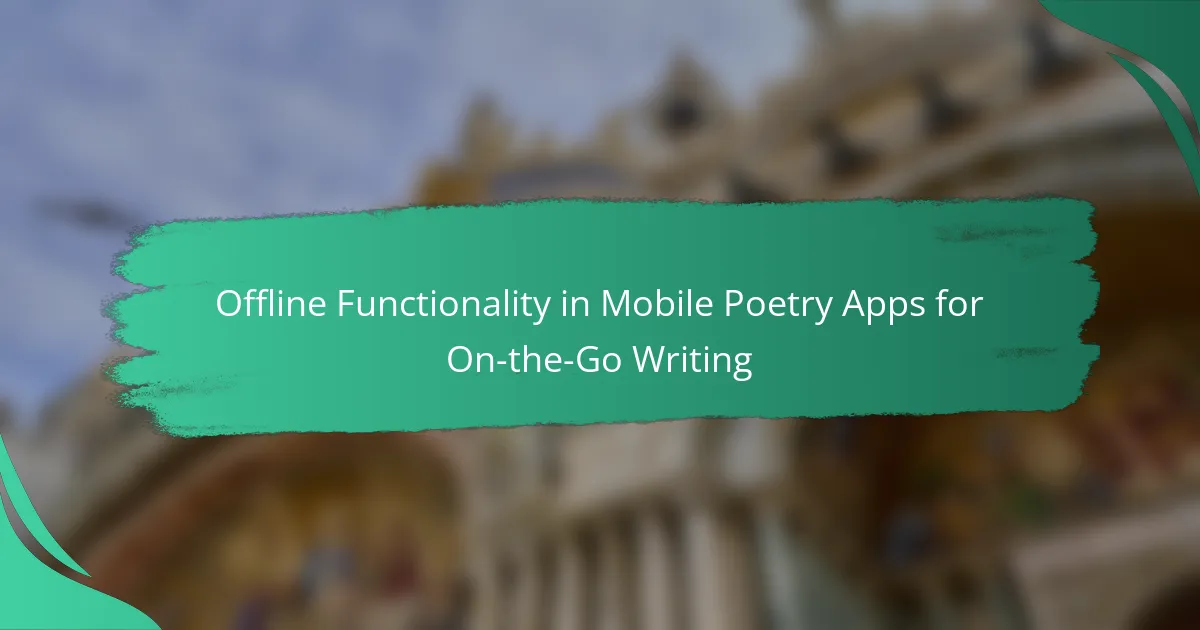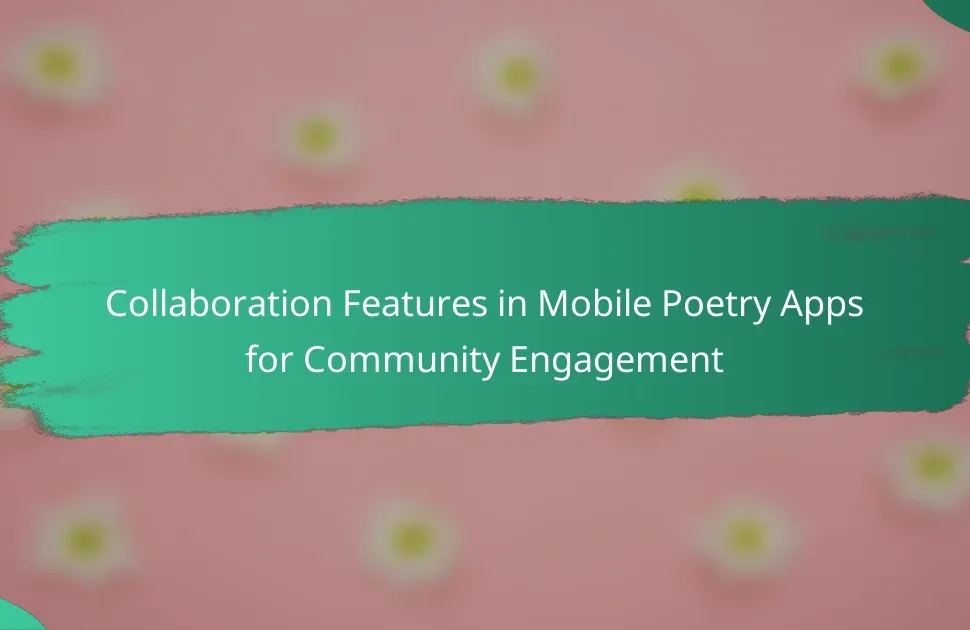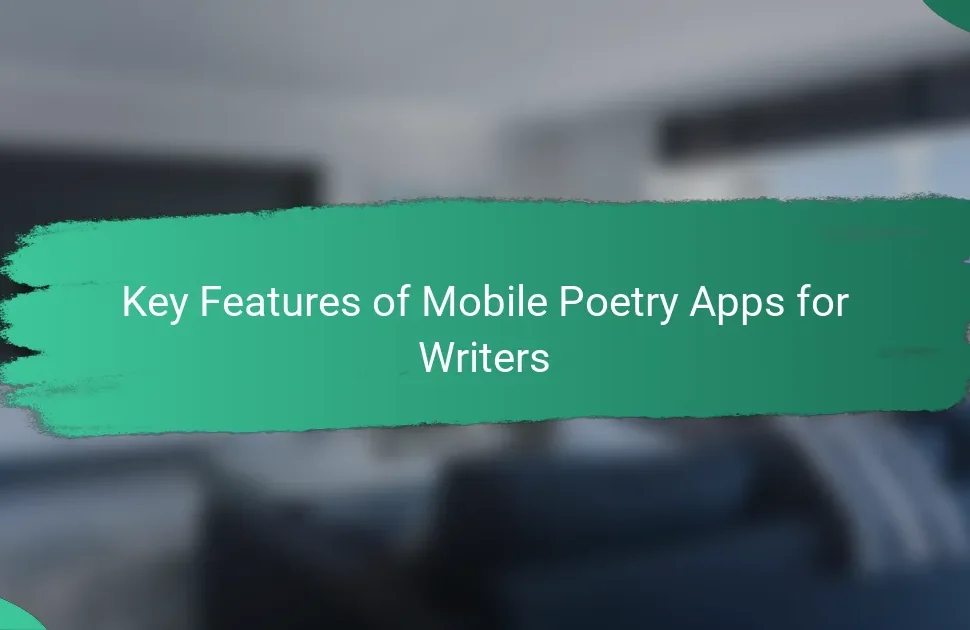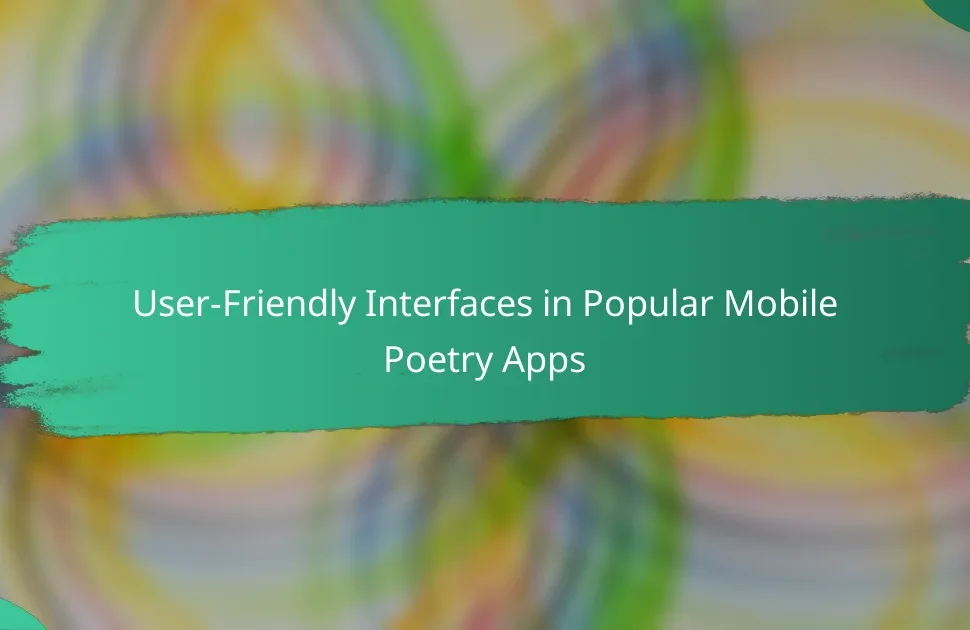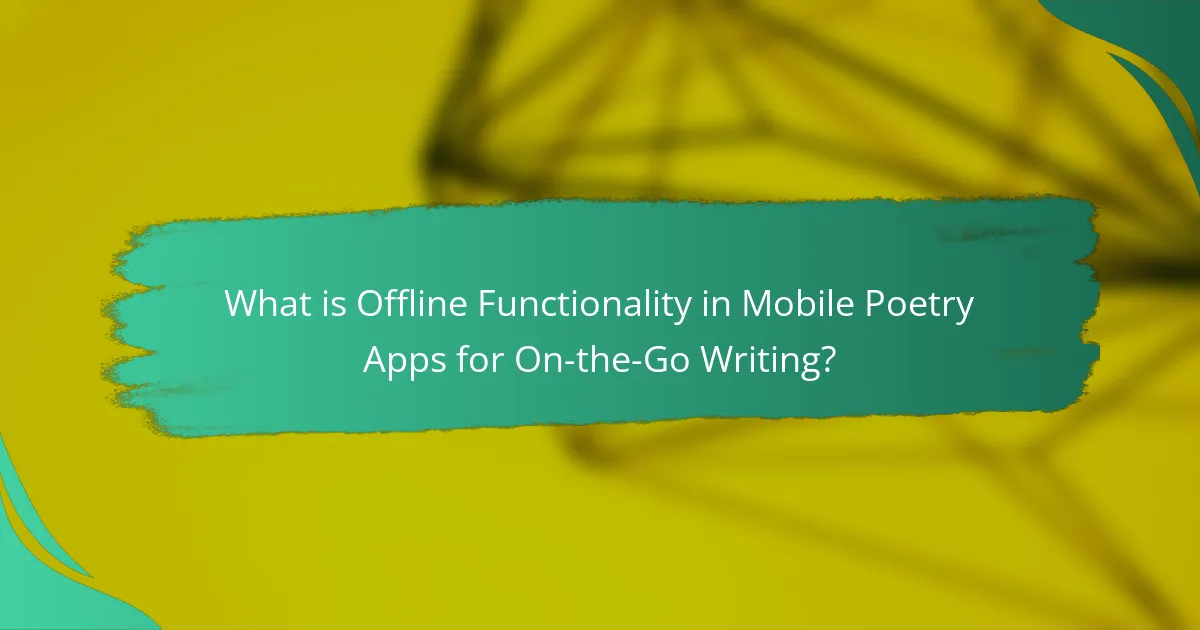
What is Offline Functionality in Mobile Poetry Apps for On-the-Go Writing?
Offline functionality in mobile poetry apps allows users to write poetry without an internet connection. This feature enables poets to create and edit their work anytime and anywhere. Offline access is crucial for on-the-go writing, as it eliminates reliance on Wi-Fi or cellular data. Many poetry apps store data locally on the device, ensuring that users can save their drafts seamlessly. This capability supports creativity in various environments, such as during travel or in remote locations. Offline functionality enhances user experience by providing uninterrupted access to writing tools and resources.
How do mobile poetry apps enable offline functionality?
Mobile poetry apps enable offline functionality by allowing users to access their poetry collections and writing tools without an internet connection. These apps store content locally on the device, ensuring that users can write and edit poetry anytime, anywhere. Features such as local storage of poems, notes, and prompts facilitate uninterrupted creative flow. Additionally, some apps offer offline modes that sync changes once the device reconnects to the internet. This capability is essential for users who may be in areas with limited or no connectivity. Offline functionality enhances user experience by providing flexibility and convenience for on-the-go writing.
What are the key features that support offline writing in these apps?
Key features that support offline writing in mobile poetry apps include local storage, auto-save functionality, and text formatting tools. Local storage allows users to save their work directly on the device. This ensures access to content without an internet connection. Auto-save functionality periodically saves changes to prevent data loss. Text formatting tools enable users to style their poetry offline. Additionally, some apps offer customizable templates for structured writing. These features collectively enhance the offline writing experience.
How does offline functionality enhance the user experience for poets?
Offline functionality allows poets to write and edit their work without needing an internet connection. This capability enhances user experience by providing uninterrupted access to their creative tools. Poets can draft verses, brainstorm ideas, and refine their poetry anytime, anywhere. For instance, they can write during commutes or in remote locations without connectivity. This flexibility encourages spontaneous creativity and reduces distractions. Furthermore, offline access ensures that poets can save their work securely, avoiding potential data loss from connectivity issues. Studies show that uninterrupted writing sessions can lead to higher productivity and creativity. Thus, offline functionality significantly improves the overall writing experience for poets.
Why is offline functionality important for on-the-go writing?
Offline functionality is important for on-the-go writing because it allows users to write without internet access. Many writers find themselves in locations where connectivity is limited or non-existent. In such situations, offline capabilities ensure that creative processes are uninterrupted. This functionality enables seamless access to writing tools and saved content. According to a study by the Pew Research Center, 77% of smartphone users utilize their devices for writing tasks. Offline access increases flexibility and convenience, allowing writers to capture inspiration anytime, anywhere. Furthermore, mobile poetry apps with offline functionality enhance user experience by providing reliable writing environments.
What challenges do poets face when writing without internet access?
Poets face several challenges when writing without internet access. Limited access to online resources hinders research for inspiration and information. Without the internet, poets cannot easily reference literary works or contemporary styles. They also miss out on online writing communities for feedback and support. The absence of digital tools restricts their ability to use writing aids or rhyming dictionaries. Additionally, poets may struggle with storage and organization of their work without cloud services. Overall, the lack of internet access significantly affects a poet’s creative process and resource availability.
How does offline access influence creativity and productivity in poetry writing?
Offline access enhances creativity and productivity in poetry writing by eliminating distractions. When poets write offline, they are less likely to be interrupted by notifications or online content. This focused environment fosters deeper thinking and reflection. Studies show that reduced digital distractions can lead to improved cognitive performance. Offline writing allows poets to engage more fully with their thoughts and emotions. As a result, they may produce more authentic and meaningful poetry. Furthermore, offline access ensures that poets can write anytime and anywhere, increasing their overall output.
What types of mobile poetry apps provide offline functionality?
Mobile poetry apps that provide offline functionality include various types designed for writing and reading poetry without an internet connection. Examples of these apps are Poetizer, which allows users to compose and save poems offline. Another example is Poetry Foundation’s app, offering access to a vast collection of poems offline. Additionally, apps like Evernote and Microsoft OneNote support poetry writing and can function without internet access. These apps enable users to create, edit, and store their work anywhere. Offline functionality is essential for poets who seek inspiration on the go.
Which popular apps are known for their offline capabilities?
Popular apps known for their offline capabilities include Google Docs, Evernote, and Spotify. Google Docs allows users to create and edit documents without an internet connection. Evernote enables note-taking and organization offline, syncing changes when online. Spotify lets users download music for offline listening. These apps provide essential functionalities even without internet access, making them useful for on-the-go writing and creativity.
What specific features do these apps offer for offline writing?
Mobile poetry apps for offline writing offer several specific features. These features include local storage of written content. Users can create and edit poems without an internet connection. Many apps provide a distraction-free writing interface. Some include customizable themes for enhanced user experience. Others offer text formatting options for better presentation. Syncing capabilities allow users to save work once online. Additionally, some apps incorporate word count tools for tracking progress. These features ensure that users can write effectively while offline.
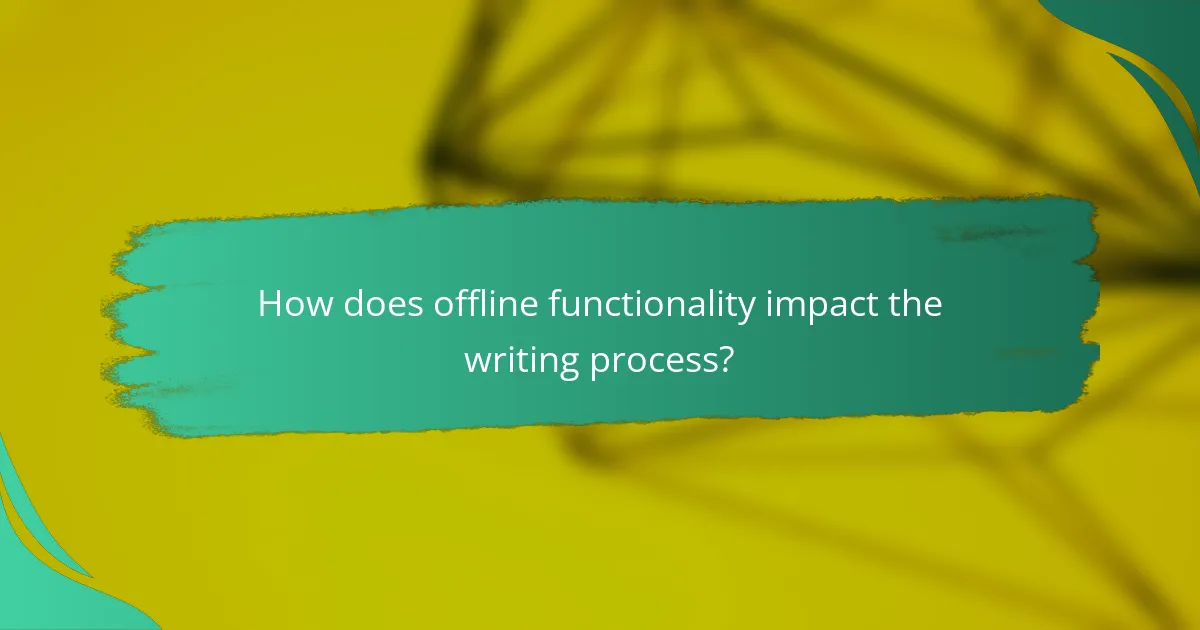
How does offline functionality impact the writing process?
Offline functionality enhances the writing process by allowing uninterrupted access to writing tools without internet dependency. Writers can create and edit their work anywhere, even in remote locations. This flexibility fosters creativity as distractions from online sources are minimized. Furthermore, offline capabilities ensure that writers can save their progress without fear of connectivity issues. Research shows that uninterrupted writing sessions can lead to increased productivity and focus. A study by the University of Southern California found that writing without online distractions significantly improved the quality of work produced. Overall, offline functionality supports a more fluid and efficient writing experience.
What advantages does offline writing provide to poets?
Offline writing provides poets with uninterrupted focus and creativity. It eliminates distractions commonly found online. Poets can immerse themselves in their thoughts without digital interruptions. This environment fosters deeper emotional connections to their work. Offline writing also allows for a tactile experience with pen and paper. The physical act of writing can enhance inspiration and flow. Additionally, poets can write anywhere without needing internet access. This flexibility supports spontaneous creativity in various settings.
How does writing offline affect the flow of creativity?
Writing offline enhances the flow of creativity by reducing distractions. Without internet access, writers are less likely to encounter interruptions from notifications or browsing. This focused environment allows for deeper concentration and more immersive thought processes. Studies show that limited connectivity can promote more original ideas. For instance, a 2018 study by the University of California found that participants generated more creative solutions when isolated from digital distractions. Thus, writing offline fosters an uninterrupted creative space that can lead to increased innovation and originality.
What role does distraction-free writing play in poetry creation?
Distraction-free writing enhances poetry creation by fostering concentration and creativity. It allows poets to immerse themselves in their thoughts without interruptions. This focused environment promotes deeper emotional connections to the subject matter. Research shows that reduced distractions lead to increased productivity and better quality of work. A study by the University of California found that multitasking can reduce productivity by up to 40%. Therefore, distraction-free settings can significantly improve the poetic process. By minimizing external stimuli, poets can explore their imagination more freely. This results in more authentic and impactful poetry.
How can poets maximize their use of offline functionality?
Poets can maximize their use of offline functionality by utilizing mobile poetry apps designed for offline access. These apps often allow users to write, edit, and save their work without requiring an internet connection. Features such as offline storage ensure that poets can access their drafts anytime. Additionally, poets should explore apps that offer offline tools like rhyme dictionaries and thesauruses. These resources enhance creativity and support the writing process without online distractions. Regularly updating apps while online ensures all offline features remain functional. This approach empowers poets to write freely in any environment, enhancing their productivity and creativity.
What tips can help poets prepare for offline writing sessions?
Poets can prepare for offline writing sessions by organizing their materials beforehand. This includes gathering notebooks, pens, or any preferred writing tools. They should also create a conducive writing environment. A quiet space with minimal distractions enhances focus. Setting specific goals for the writing session can be beneficial. Goals might include completing a poem or brainstorming ideas. Additionally, poets can practice writing prompts to stimulate creativity. Engaging in warm-up exercises can help overcome writer’s block. Finally, ensuring that any necessary references or inspiration materials are accessible can aid in the writing process.
How can poets organize their ideas for offline writing effectively?
Poets can organize their ideas for offline writing effectively by using structured outlines and mind maps. Outlines help poets categorize themes, emotions, and imagery in a linear format. Mind maps allow for a visual representation of interconnected ideas, fostering creativity. Both methods can be created on paper or in offline digital tools. Keeping a dedicated notebook for poetry can also aid in idea organization. This approach allows for easy reference and development of thoughts over time. Studies show that visual organization techniques enhance memory retention and idea generation. Therefore, employing these strategies can significantly improve a poet’s offline writing process.
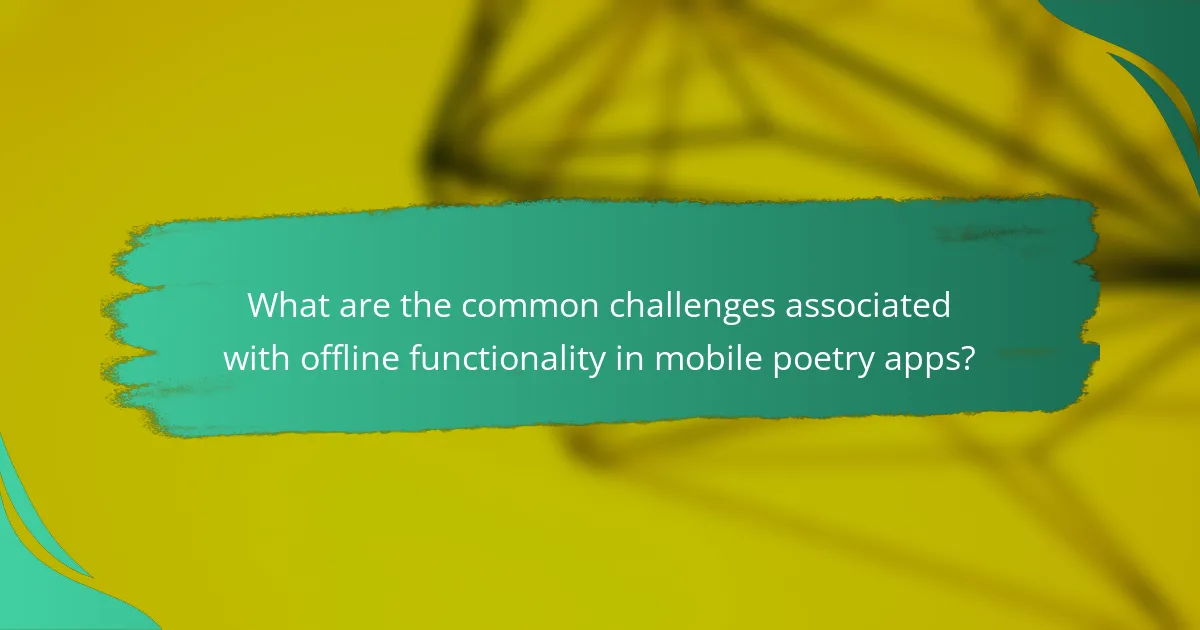
What are the common challenges associated with offline functionality in mobile poetry apps?
Common challenges associated with offline functionality in mobile poetry apps include limited access to content and features. Users may struggle to access saved poems or resources without internet connectivity. Synchronization issues can arise when users reconnect online, potentially leading to data loss or duplication. Performance may degrade due to lack of local storage optimization. Additionally, some apps may not support offline editing, restricting user creativity. Users also face challenges in sharing their work without internet access. These factors can hinder the overall user experience in mobile poetry apps.
What limitations do poets encounter with offline writing features?
Poets encounter several limitations with offline writing features in mobile poetry apps. One limitation is the lack of access to cloud storage, which restricts saving or syncing work across devices. This can lead to data loss if the device malfunctions or is lost. Another limitation is the absence of online resources, such as rhyming dictionaries or thesauruses, which can hinder creativity and word choice. Offline modes may also limit collaboration features, preventing poets from sharing or receiving feedback in real-time. Additionally, some apps may not offer full functionality offline, restricting formatting options or editing tools. These limitations can impact the overall writing experience for poets who rely on mobile apps for their creative process.
How do storage constraints affect offline functionality in poetry apps?
Storage constraints limit the amount of data poetry apps can store for offline use. When storage is low, apps may not be able to download or save entire poetry collections. This results in users having access to fewer poems when offline. Additionally, limited storage can restrict the app’s ability to cache user-generated content. Users may find it challenging to save their work for later access. The performance of the app may degrade, leading to slower loading times. In extreme cases, the app may fail to function entirely without an internet connection. Overall, storage constraints significantly hinder the offline experience in poetry apps.
What are the potential technical issues poets might face when using offline modes?
Poets may face several potential technical issues when using offline modes. Limited access to cloud storage can hinder saving and retrieving poems. Without internet, poets cannot sync their work across devices. Formatting inconsistencies may arise when transitioning between online and offline versions. Software bugs can occur, leading to crashes or data loss. Lack of updates while offline may leave poets with outdated features. Additionally, offline modes may restrict access to collaborative tools. These issues can impact the overall writing experience in mobile poetry apps.
What best practices can poets follow to troubleshoot offline functionality issues?
To troubleshoot offline functionality issues, poets should first check their app settings. Ensure that offline mode is enabled within the app. Next, poets should verify that the device has sufficient storage space for saving work. They should also check for any available app updates that may resolve bugs. Restarting the app can refresh its performance and resolve minor glitches. If issues persist, poets can consult the app’s help resources or community forums for specific troubleshooting tips. Lastly, poets should consider reinstalling the app if problems continue, as this can often resolve deeper software issues.
How can poets ensure their work is saved properly while offline?
Poets can ensure their work is saved properly while offline by using reliable mobile poetry apps that offer offline functionality. These apps typically allow users to create and edit poems without an internet connection. It is crucial for poets to regularly save their drafts to prevent data loss. Many apps automatically save progress periodically, providing an added layer of security. Poets should also manually save their work frequently, especially after significant edits. Utilizing cloud backup options when online can further protect their poems. Ensuring the app is updated can enhance its performance and reliability. By following these practices, poets can safeguard their creations effectively.
What steps should poets take if they encounter synchronization problems after going online?
Poets should first check their internet connection if they encounter synchronization problems after going online. A stable connection is essential for successful syncing. Next, they should restart the mobile poetry app to refresh its functionality. This often resolves minor glitches. If issues persist, poets should clear the app’s cache through their device settings. This action can remove temporary files that may be causing conflicts. Additionally, poets should ensure that the app is updated to the latest version. Updates often include bug fixes for synchronization issues. If none of these steps work, contacting the app’s customer support is advisable. They can provide specific guidance tailored to the app’s functionality.
Offline functionality in mobile poetry apps enables poets to write and edit their work without an internet connection, enhancing the creative process by providing uninterrupted access to writing tools. The article explores how these apps support offline writing through features like local storage, auto-save, and text formatting tools, while also addressing the importance of offline access for on-the-go writing. Key challenges faced by poets, such as limited access to online resources and potential synchronization issues, are discussed alongside best practices for maximizing offline capabilities. Overall, the article highlights the significance of offline functionality in fostering creativity and productivity among poets in various environments.
